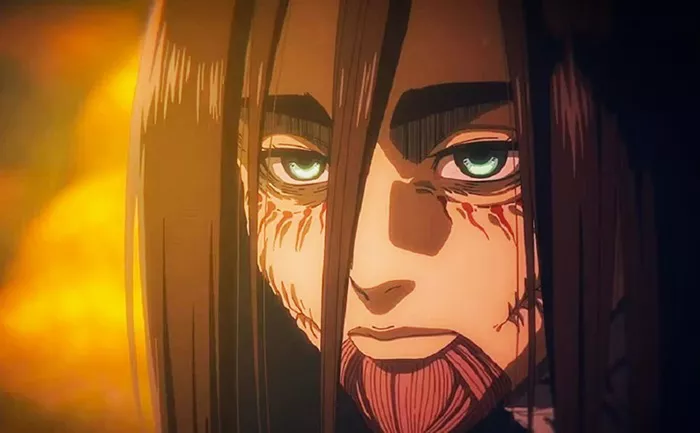Attack on Titan, the anime phenomenon that has captivated audiences worldwide, concluded with a finale that not only tied up its complex storylines but also reshaped how we view the traditional concepts of heroes and villains. Through its deeply flawed characters, shifting allegiances, and moral dilemmas, Attack on Titan challenges long-held ideas about good and evil, blurring the lines between the two.
In particular, the transformation of Eren Yeager, the series’ protagonist, from a passionate hero to an anti-hero and, ultimately, a villain, serves as a pivotal moment in this exploration. The anime’s bold approach forces viewers to reconsider what defines a hero—and whether the concept is as clear-cut as we’ve been led to believe.
The Shifting Role of Eren Yeager
From the very beginning, Attack on Titan presents Eren as a character driven by an intense desire for freedom. Living on Paradis Island, humanity is confined behind colossal walls, constantly under threat from the mysterious Titans. Eren’s journey begins with a traumatic event: the death of his mother during a Titan attack. This tragedy ignites a fiery resolve in Eren to eradicate the Titans and free his people.
However, as the series unfolds, Eren’s character evolves in unexpected ways. After joining the Survey Corps, Eren initially gains the ability to transform into a Titan, and with this power, becomes an invaluable weapon for humanity’s military. Despite his seemingly heroic ambitions, Eren begins to lose his humanity, facing increasingly difficult choices that force him to confront the brutality of the world and the cycle of violence in which he’s trapped.
In a critical moment, Eren’s view of the world shifts drastically. Upon discovering the truth about his world, its history, and the Titans’ origins, he embarks on a path of devastation. Eren’s decision to initiate the “Rumbling”—a cataclysmic event that threatens to annihilate humanity outside Paradis Island—forces viewers to ask whether his actions are those of a savior or a madman.
“I hate this world. I hate the people in it. But… I’ll never stop fighting. I’ll never stop until I destroy this world that took everything from me,” Eren declares, encapsulating the transformation from protector to destroyer.
This shift in Eren’s character illustrates Attack on Titan’s central theme: the idea that heroes and villains are not defined by clear moral boundaries, but by the circumstances and decisions that drive them.
Marley’s Perspective: Victims or Villains?
On the opposing side of the conflict lies Marley, the nation at war with Paradis. Initially portrayed as the enemy, Marley’s military figures—like Gabi and Falco—are revealed to be more than just antagonists. Gabi, in particular, mirrors Eren’s earlier obsession with protecting her homeland, willing to commit heinous acts in the name of defense.
“I don’t care about the people of Paradis! I just want to protect Marley and everyone I love!” Gabi exclaims, echoing Eren’s own sentiments from earlier in the series.
As the story progresses, Attack on Titan reveals that the hatred between Marleyans and Eldians is not as one-sided as it first appeared. While Marley’s aggression toward Paradis is fueled by centuries of violence and historical trauma, the Eldians’ past misdeeds—including their use of the Titans to terrorize the world—complicate the moral landscape. The deep-rooted animosity between the two factions raises the question of whether Marley’s actions, though extreme, are justified given the history of oppression they have suffered.
Not Your Typical Heroes: Complex Moral Choices
The deeper Attack on Titan delves into the characters’ psyches, the more it subverts the typical heroic archetypes found in traditional anime. Characters like Reiner, Annie, and Bertholdt—initially introduced as enemies—are eventually revealed to have their own struggles and motivations, forcing viewers to question their initial assumptions.
Reiner, in particular, presents a compelling case for the blurred lines between good and evil. He begins the story as a soldier loyal to Marley but later expresses disillusionment with his mission. His internal conflict, expressed in his famous line, “The truth is that the world is an endless cycle of pain and suffering, and we all have our roles to play in it,” adds depth to the narrative and underscores the show’s theme of moral ambiguity.
Similarly, Armin, who starts as a timid and weak character, gradually becomes a more complex figure after inheriting the power of the Colossal Titan. Armin is forced to make difficult decisions, including sacrificing lives for the greater good. Mikasa, Eren’s loyal companion, faces her own heart-wrenching choices, ultimately having to decide between saving the world or saving Eren, her closest friend. These complex moral choices further demonstrate how Attack on Titan challenges traditional notions of heroism.
Attack on Titan: No True Heroes, No True Villains
In the series finale, the narrative delivers a powerful message: there are no true heroes or villains, only individuals shaped by their circumstances and choices. The characters’ flaws, desires, and conflicting ideals underscore the reality that in times of war, people are forced to make impossible decisions that often defy simple categorizations of good and evil.
Through its complex portrayal of characters and their journeys, Attack on Titan has redefined the hero-villain dichotomy in anime, offering a more nuanced perspective on the nature of conflict and the moral gray areas that define it. By showing us both sides of the Eldian-Marleyan conflict, the series has invited viewers to reflect on the consequences of unchecked power, the importance of empathy, and the human condition at its most raw and vulnerable.
In the end, Attack on Titan succeeds in demonstrating that the line between heroism and villainy is often a matter of perspective—one that is shaped by history, ideology, and, most crucially, the choices individuals make when faced with impossible odds.
Related Topics
- Akane Kurokawa from Oshi no Ko Featured in Stunning New Year 2025 Illustration
- Ameku M.D.: Doctor Detective Unveils Opening and Ending Songs
- New Character Trailer Released for ‘The 100 Girlfriends’ Season 2


